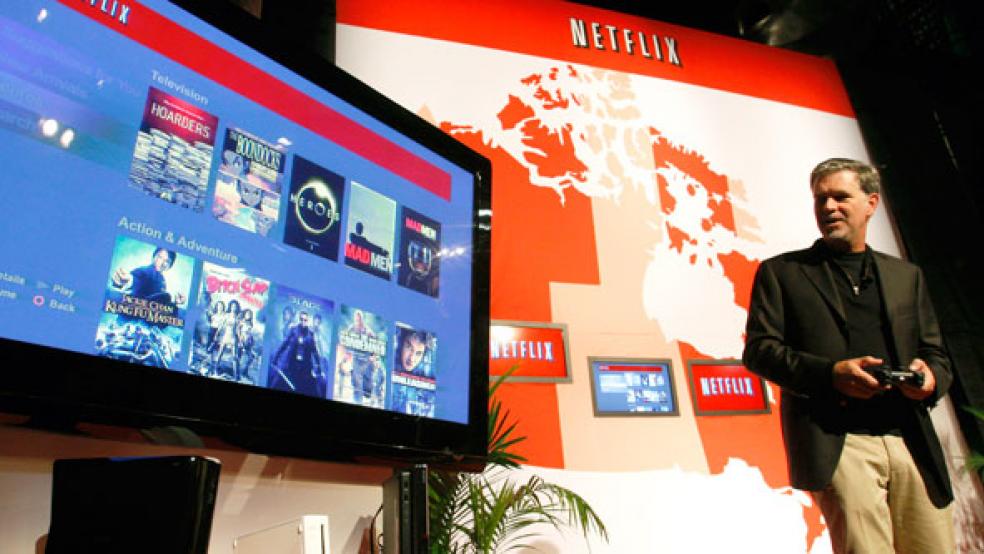One by one, Netflix (NASDAQ: NFLX) is declaring war on its traditional TV competitors.
It has taken on Time Warner's (NYSE: TWX) HBO most directly, making a splash by developing “House of Cards,” its well-received drama series starring two-time Oscar-winning actor Kevin Spacey. Just watch clips from the recent White House Correspondents Dinner, where a clever “House of Cards”-inspired video electrified the proceedings and once again gave Netflix some tremendous brand recognition among the heavy hitters in attendance.
Next in Netflix’s sights: Viacom (NASDAQ: VIAB) and its hold on kiddie programming through the Nickelodeon channel.
Netflix CEO Reed Hastings last month outlined a new strategy for the company, one that has it looking for exclusive content and “select programming” rather than costlier, broad-based deals that fill its library with less-successful titles in addition to hits.
“By dealing directly with the producers of TV shows, we are better positioned to pick just those shows that we believe will work best and secure rights that may be otherwise blocked by TV carriage and transmission deals,” Hastings wrote to shareholders. “As we continue to focus on exclusive and curated content, our willingness to pay for non-exclusive, bulk content deals declines.”
As of this month, Netflix lost the rights to some 1,800 titles – and it’s about to lose more. “At the end of May we’ll be allowing our broad Viacom Networks deal for Nickelodeon, BET, and MTV content to expire,” Hastings announced in his letter last month. “We are in discussions with them about licensing particular shows but have yet to conclude a deal.” Instead of scrambling to re-up with Viacom at any price, Netflix is shrewdly embracing Viacom’s successful programming blueprint as its own.
What has Viacom done right? Viacom CEO Sumner Redstone once famously declared, “Content Is King!” – a catchy, alliterative line that journalists have repeated many times over the years. Besides being pithy, the statement is also true. Redstone has made that mantra the cornerstone of his company’s strategy by marketing specific channels for each prominent age group.
Recognizing the appeal of contemporary music as both a universal force and a popular culture touchstone, Viacom long ago made MTV one of the world’s most sought-after cable channels. The company also understood how personally important rock and roll was to the Woodstock generation, which grew up and ultimately swapped tie-dyed vests for briefcases. To appeal to the nostalgic, well-heeled baby boomers who are running the world, Viacom pushed VH-1 for their interests. And adhering to its own version of “no child left behind,” Viacom popularized Nickelodeon for very young children who were still too young for MTV’s fare.
Now, Netflix (NFLX) wants a piece of Nickelodeon’s action, but on its own terms. To make up for the loss of Nickelodeon shows, Netflix is bringing on five new programs from Walt Disney’s (DIS) Disney Junior and Disney XD cable channels. Netflix is first introducing “Jake and the Never Land Pirates” and “Tron: Uprising.” Next up: “Handy Manny,” “Special Agent Oso” and “JoJo’s Circus.”
Just to underscore the point that business is business – at any age – this arrangement will follow all of Netflix’s television structures. It is a “catalog pact,” so the company can’t show the programs until after they’ve appeared at least one time on TV.
The decision to make strides in kiddie programming underlines Netflix’s own ambitious segmented strategy of appealing to viewers of all ages. It is aggressively pursuing the family market on many fronts.
Along those lines, can original programming directed at the toddler market be far behind for Netflix? To put its stamp on this potentially lucrative genre, Netflix would have to re-invent children’s entertainment to a degree. But the company doesn’t shy away from the challenge.
It’s possible that Netflix will create its own programming for very young people, at least someday. Just as Netflix was savvy enough to give Spacey a meaty acting challenge in “House of Cards,” it can no doubt pluck a movie or television star into an original show for youngsters, too.
In children’s programming, as in everything else in the entertainment industry, it remains true that content is king. But what is supreme is how a company can make the most money possible from that content. By creating it, Netflix can be in a unique position to challenge Viacom’s supremacy in a popular, specialized market.






